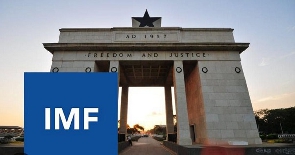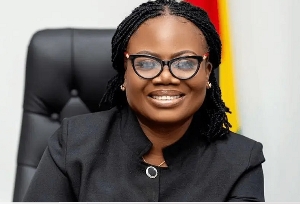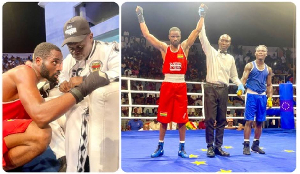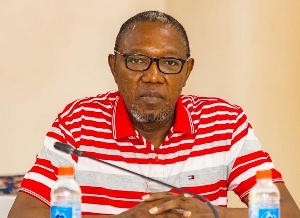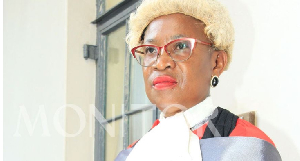Opinions of Wednesday, 17 May 2023
Columnist: Ananpansah Bartholomew Abraham
The role of International Monetary Fund (IMF) and Ghana´s history of IMF bailouts
For over half a century, Ghana's government leaders have looked to the International Monetary Fund (IMF) anytime their economic policies fail.
The IMF, an international organisation consisting of 190 member countries, was formed in 1945 to promote global financial integration and cooperation. IMF membership provides nations with a platform to work together to foster global monetary cooperation, secure financial stability, promote high employment among member countries, facilitate international trade, reduce poverty, and promote sustainable economic growth.
Each member country of the IMF has voting rights, and voting power is largely determined by quotas. Countries with more significant economies, such as the United States, Great Britain, Russia, and Germany, have more voting power than smaller countries, such as Benin or Togo.
The IMF has various lending instruments tailored to different types of balance of payments needs as well as the specific circumstances of its diverse membership.
When countries seek an IMF bailout, it is more for breathing room than actual financial help. IMF bailout enables countries to implement adjustment policies and programs in an organised manner, which eventually restores conditions for more stabilised and sustainable economic growth.
The adjustment programs or policies of the IMF vary, depending on the economic conditions of a country. A country suffering from severe capital outflows may need to first address circumstances that led to a loss of investor confidence before seeking financial assistance.
Ghana's long association with IMF adjustment programs dates back to the early 1960s, shortly after it gained Republican status. Despite being relatively stable economically, Ghana has relied on the IMF to implement adjustment programs and get the economy back on track. Most of the instances in which Ghana has gone to the IMF boil down to economic mismanagement and careless spending.
In 1966, after the overthrow of Dr. Kwame Nkrumah by the National Liberation Council led by General Kotoka, Ghana joined the IMF. Between 1966 and 1969, the military government invited the IMF and the world, in what was referred to as a 'standby arrangement', to stabilise the virtually falling apart economy. For these three years, the IMF oversaw the privatisation of most unprofitable state enterprises and institutions to transform them into profitable enterprises.
In 1979, Ghana returned to the IMF after years of poor economic management, careless spending, corruption, and military coups. Before returning to the IMF, General Ignatius Kutu Acheampong led a revolution in the nation called 'Operation Feed Yourself', an agricultural initiative aimed at boosting agricultural production. The Operation Feed Yourself campaign lasted from 1972 to 1978.
On June 4, 1979, Flt. Lt. Jerry John Rawlings led a revolution and overthrew General Acheampong because of the socialist idea of operation feed yourself. The economic conditions in Ghana at this time were getting messier, inflation was high, and items such as soap and other imported goods became very expensive, leading to a successful overthrow of the government and the installation of a civilian government.
In 1979, the newly elected government requested an IMF bailout to deal with the economic woes in the country.
During the regime of Rawlings, Ghana went to the IMF twice; signing up for the 1987 and 1988 bailout programs. During his regime, Ghana experienced severe food shortages and famine between 1981 and 1983 as a result of climate change conditions. The country, which relied on food aid from humanitarian agencies, saw the worst economic crisis in modern times in 1983. Due to this crisis, the leader of the Provisional National Defence Council, JJ Rawlings, asked for an IMF bailout with a structural adjustment program.
The IMF removed state influences over the economy and replaced them with a market-oriented one, the economic recovery program introduced by the IMF helped government stabilise the economy and brought inflation down from 143% in 1983 to 10% by the end of 1991.
1995, 1999, 2003, and 2009 debt cancellation period:
In the middle 1990s global financial institutions including the IMF started a campaign to cancel or eliminate debts of countries that were considered highly indebted. Because of this exercise, countries considered as such were brought under a program called 'Highly Indebted Poor Countries (HIPC)'. Under this program and the leadership of JJ Rawlings, Ghana received support from the IMF in 1995 and 1999, seeing debts of the country cancelled, and resources meant to pay off the debts rather used to build schools, hospitals, roads, and public toilets.
Ghana in 2003 yet again returned to the IMF as a highly indebted poor country under the leadership of President John Kufuor. Ghana received debt relief, which reduced the country’s debt from $66 billion in 2003 to $ 23 billion by 2006. Thus, funds meant for debt repayment as instructed by the IMF were channeled towards healthcare, sensible government policies, and education.
2015 dumsor and IMF bailout program:
In the year 2015, under the John Mahama administration, Ghana experienced serious economic difficulties because of a power crisis that came to be known as “dumsor”. This power crisis and its resultant economic consequences pushed the country back to IMF seeking assistance for a bailout.
The IMF offered the country a $918 million loan facility to finance reform initiatives aimed at accelerating economic development and job creation while preserving social spending.
The 2015 IMF bailout helped stabilize the Cedi and bolster the country’s faltering economy.
2022 return to the IMF:
The Ghana government, through the Minister of Finance, Ken Ofori Atta in 2022 announced the government’s decision to return to the IMF for a bailout. The decision by the government created a divided public opinion.
The government however explained that, the Covid 19 and the Russia -Ukrainian crisis are the main reasons for the economic downturn in the country as inflation hits about 125% over the past 3 months.
The Ghana government has proposed an 'Enhanced Domestic Programme' to the International Monetary Fund, which will span for a minimum of 3 years. The government has however indicated that there will in no way try to cut off administration flagship programs such as the building of schools, roads, hospitals, free SHS education programs, and building of factories in all the 216 constituencies as pledged by the government during its election campaign.
Looking at Ghana´s debt servicing cost, which is 48% of the government's total revenue, many experts believe that Ghana’s proposal to the IMF will prove complicated, as the proposal to the IMF will require debt restructuring. Though, the finance minister thinks otherwise.
Looking at Ghana’s history with the IMF, it appears that almost all the heads of state excluding Dr. Kwame Nkrumah have in one way or another other seek an IMF bailout, including the current government under the leadership of Nana Addo Dankwa Akufo-Addo, who; though assured the citizens that Ghana was beyond IMF agenda.
The question begging for answers is how long will we keep going back to the IMF as a country?

